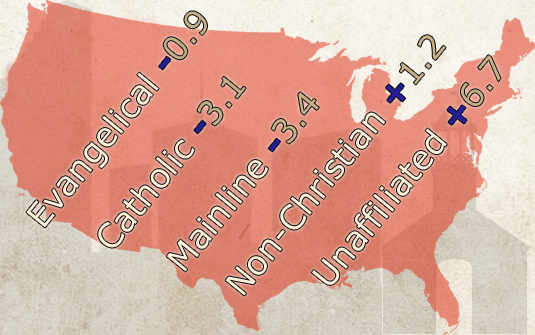by David Roach
NASHVILLE (BP) — The number of Christians in America has dropped nearly 8 percentage points since 2007 while the number of religiously unaffiliated adults has increased by nearly 7 percentage points during the same period.
That’s the finding of the Pew Research Center’s 200-page study of “America’s Changing Religious Landscape” released May 12. The survey of some 35,000 adults drew a variety of reactions from Southern Baptist leaders.
“The results of the survey communicate growing evidence that the greatest need in America is a spiritual awakening,” Southern Baptist Convention President Ronnie Floyd told Baptist Press in written comments. “The time is now and the hour is urgent; our churches in this nation must come together in clear agreement, visible union and extraordinary prayer for the next Great Awakening and to reach America and the World for Christ.
“Simultaneously, we need to rise with the same urgency, having a vision to reach our communities, towns and cities for Christ, returning to the priority of evangelizing, disciple-making and planting Gospel churches exponentially,” said Floyd, pastor of Cross Church in northwest Arkansas.
Pew’s survey — conducted by phone June 4-Sept. 30, 2014, in Spanish and English — estimated a net decline of between 2.8 to 7.8 million Christians since a comparable survey in 2007. That translates to a drop from 78.4 percent of the U.S. population to 70.6 percent.
Most of the decline occurred among mainline Protestants and Roman Catholics, with each decreasing by approximately 3 percent as a portion of the population since 2007. For every convert to Catholicism in America, there are six former Catholics, according to the report.
Historically black Protestant denominations held steady between 2007 and 2014, and evangelicals decreased 0.9 percent as a portion of the population while increasing by some 2 million in terms of raw numbers.
“Generational replacement” as Americans from predominantly Christian generations died and “religious switching” were two primary causes of the decline among Christians, the survey found. A full 42 percent of Americans have a different religion than they did in childhood — a percentage that accounts for switches between evangelical, mainline and historically black Protestantism.
Non-Christian religions have increased by 1.2 percentage points since 2007 to encompass 5.9 percent of American adults.
But the increase of the religiously unaffiliated population — dubbed the “nones” — was the “most dramatic” change, a Pew senior adviser told journalists during a May 12 conference call.
“This trend towards the unaffiliated has occurred among all age groups to some extent and among all the major racial and ethnic communities as well,” said John Green, a Pew senior advisor and distinguished professor of political science at the University of Akron. “In this regard, of particular note is a sharp increase in the percentage of Americans who self-identify as atheists and agnostics.”
While 25 percent of the nones claimed to be atheists or agnostics in 2007, 31 percent claimed those designations in 2014. Over the same period, the percentage of Protestants who identify with Baptist denominations dropped from 41 percent to 36 percent.
“This research reveals that which many of us have been suspecting for quite some time,” said Frank S. Page, president and CEO of the Southern Baptist Convention’s Executive Committee. “We have seen the ever-increasing secularization of our culture and know that this is affecting those who call themselves Christians.
“Pastors and evangelists for years have said that we are always only one generation away from becoming a pagan culture,” Page told BP in written comments. “The importance of personal evangelism cannot be overstated. Our world needs Christ, and He has commissioned us to be the sharers of the Gospel. Let us recommit to telling those in our sphere of influence about the good news of our Lord Jesus Christ.”
Ed Stetzer, president of LifeWay Research, underscored the survey’s finding that evangelicals now constitute a majority (55%) of American Protestants. He highlighted the steadiness of “convictional Christianity” amid the decline of liberal Protestantism.
“Christianity isn’t dying and no research says it is,” Stetzer wrote in a blog post. “The statistics about Christians in America are simply starting to show a clearer picture of what American Christianity is becoming — less nominal, more defined, and more outside of the mainstream of American culture.
“For example, the cultural cost of calling yourself ‘Christian’ is starting to outweigh the cultural benefit, so those who do not identify as a ‘Christian’ according to their convictions are starting to identify as ‘nones’ because it’s more culturally savvy,” Stetzer wrote. “Because of this, the statistics show (on the surface) that Christianity in America is experiencing a sharp decline. However, that’s the path of those who don’t read beyond the surface. If there remains a relatively stable church-engaged, convictional minority, and there is a big movement on self-identification, that means that the middle is going away.”
Russell Moore, president of Southern Baptists’ Ethics & Religious Liberty Commission, said he sees hopeful signs amid Pew’s report.
“This study makes it clear … that people who don’t want Christianity don’t want the almost-Christianity offered to them by traditions that jettison the historic teachings of the church as soon as they become unfashionable,” Moore said according to an ERLC news release.
“The churches that are thriving are the vibrant, countercultural congregations that aren’t afraid to not be seen as normal to the surrounding culture. This report actually leaves me hopeful. The Bible Belt may fall. So be it. Christianity emerged from a Roman Empire hostile to the core to the idea of a crucified and resurrected Messiah. We’ve been on the wrong side of history since Rome, and it was enough to turn the world upside down,” Moore said.
The report is the first of two expected from Pew this year on America’s changing religious landscape. The second report will detail Americans’ specific beliefs and practices.
David Roach is chief national correspondent for Baptist Press.
Reprinted from Baptist Press (www.baptistpress.com).
Baptist Press (BP) is the official news service of the Southern Baptist Convention and provides news to the 42 state Baptist papers. BP reports on missions, ministry and witness advanced through the Cooperative Program and on news related to Southern Baptists’ concerns nationally and globally.







